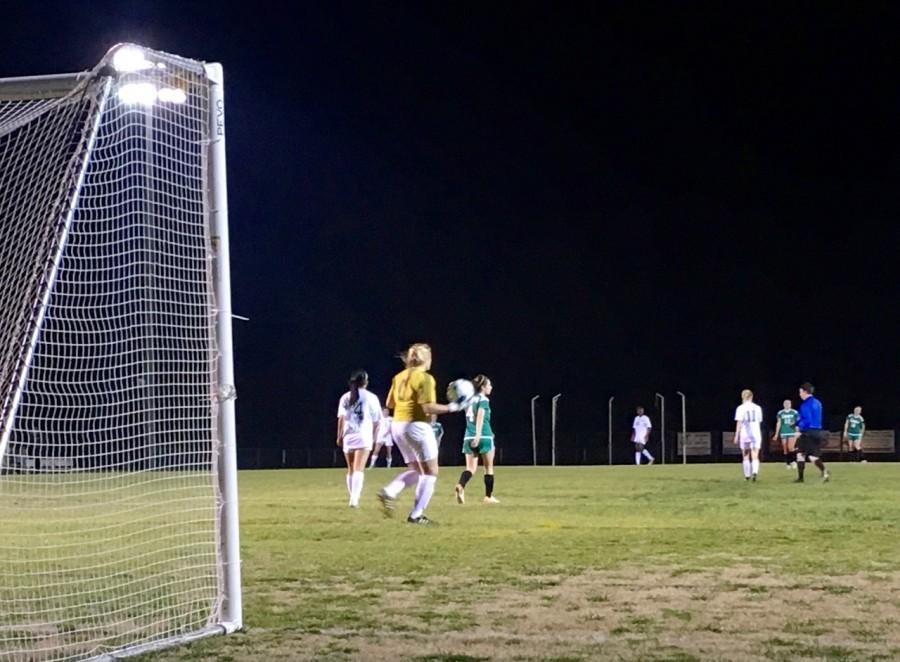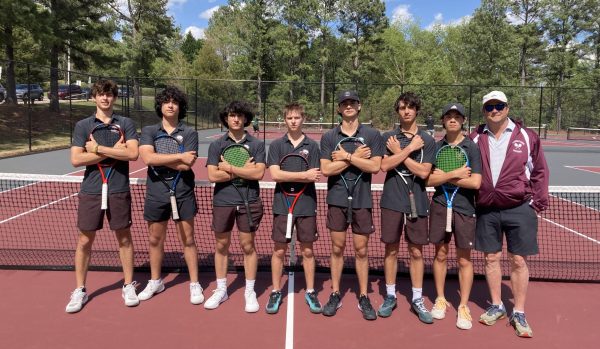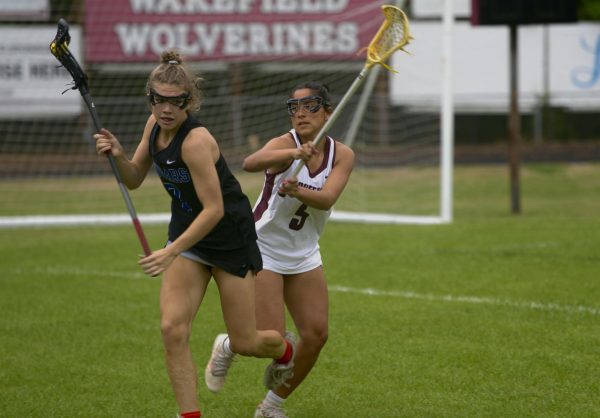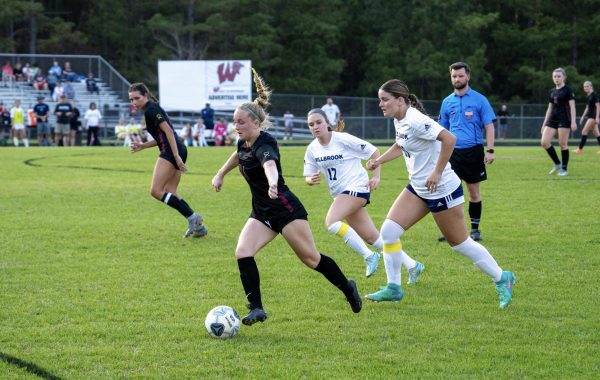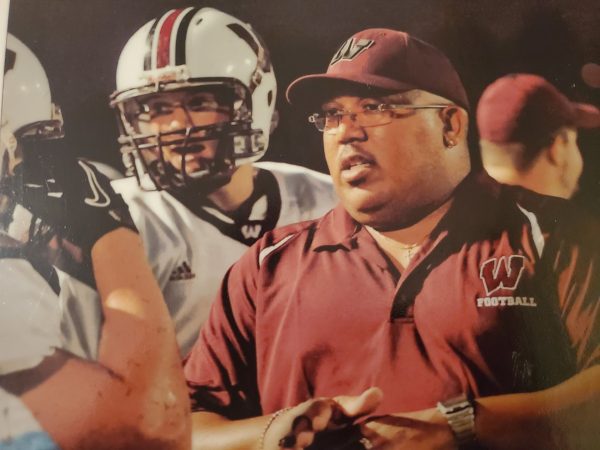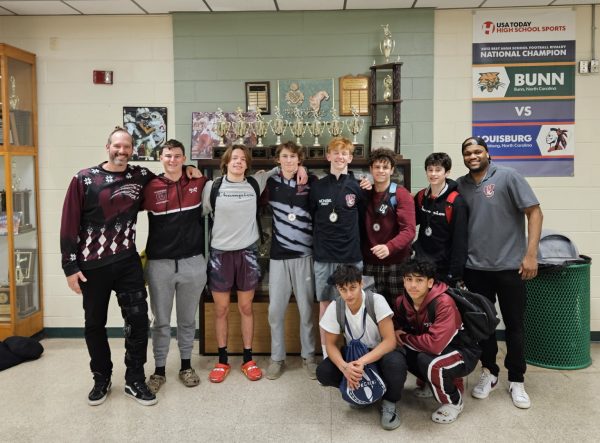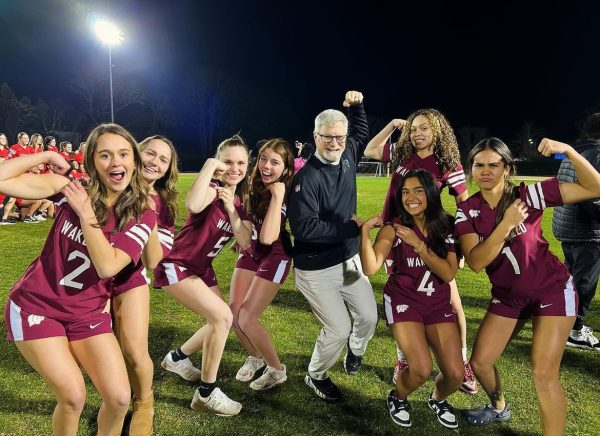Inside the mind of a goalie
A look at how goalies handle being the last line of defense.
Staff Photo by Yasine Mirmozaffari
Clare Witt, goalkeeper, prepares to punt the ball.
When an opposing team gets a break away, the only thing stopping them from scoring is the goalie, one of the most important and bravest members of the team in all sports. A goalie is vocal leader of a team and is called upon to save the day.
“Goalies have to have quick, analytical minds,” according to npr.org in a story published in 2010. “It’s about analyzing, and quickly computing, probabilities. You must assimilate everything going on in a game.”
“When attackers are coming at me I’m thinking about what side he’s holding his stick, cutting his angle off,” said senior Jake Weitnauer, varsity men’s lacrosse and soccer goalie. “I try to identify each player’s strengths and weaknesses and predict where they shoot.”
Goalies often have the most pressure on them, but in order to be successful they must adequately cope with it.
“You know, I don’t know what pressure is,” said senior Taha Mirmozaffari, men’s soccer goalie. “Pressure can either build a diamond or burst a pipe.”
Goalies must be focused, vocal and serious. They are the last line of defense and are called to save the team.
“A keeper has to know he is the last defender,” said Mirmozaffari. “He is the strongest one on the team. Why? Let’s say you’re in war, your defending the gate of your kingdom. Your defense is defeated and you are the last one so you have to be the strongest! That’s why they put you back there, you should not let anything get past you.”
One of the toughest parts of being a soccer goalie is stopping a penalty. When a penalty is awarded, all eyes are on the goalie to stop it. A recent study at the University of Exeter found with penalty kicks, it’s all about increasing the anxiety in the shooter. The goalie should never make eye contact with the goalie. We always knew that, and now science knows it,”
“Soccer is definitely a mind game,” said Weitnauer. “You have to get in the zone and get into your opponent’s head. You take a guess on which side they’re shooting and how high to jump.”
The mental side of the game is huge for goalies. Physical skills are needed, but understanding the mental aspect is crucial. Remaining confident helps goalies stay calm and focused on the ball and the incoming attackers.
In 2012, an average 23 goals per game were scored in women’s Division 1 lacrosse and 20 for men’s (via NCAA). When a goal is scored, confidence helps with accepting the error and moving on, along with keeping the team focused and confident in you, the goalie.
“A goalie should be mentally strong,” said senior Jessica Lynch, women’s lacrosse goalie. “Lacrosse is a high scoring game and you can’t let a goal bother you, you just have to move on and focus on what’s in front of you.”
According to the richest.com, the top 10 highest paid professional soccer goalies made between 2.8 million dollars and 6.8 million dollars a year. Since they are one of the highest paid and most important players on teams, their work ethic during training has to be high. Attention to detail and proper form are very important for goalies to practice.
Many drills in practice revolve around shooting on goal and giving the goalies a chance to improve.
“I enjoy diving drills the most,” said senior Clare Witt, Women’s Soccer goalie. “It works on my ball handling and taking hard shots. The drills make me better by having me control the ball out of the air, which is needed during a game.”
Lynch prefers the lacrosse drills that help with reactions.
“My favorite drill is when I turn my back to the person shooting,” said Lynch. “They yell ‘turn’ as they shoot, so I have to run around really quickly and try to save the shot. I like it mainly because you can’t overthink things, you only have time to react to them.”
Without communication, a team can be disorganized, dysfunctional, and experience poor results. In order for the defense to know who to mark, which way to shift, and where attackers are moving, a goalie must be able to communicate with the defense. Goalies have the advantage of seeing the whole field and are able to see the shape of the defense.
“I usually focus on making sure we all are communicating,” said Lynch. “Because of my position, I am able to see things that defenders can’t always see with their back turned, so it’s my job to let them know what’s going on. I also have to make sure I’m ready to react to a shot.”
Can a goalie win a game for a team?
“Technically, yes,” said Witt. “If they really come in and make a lot of saves, stay confident, and lead the team, they can make a huge difference. If a goalie doesn’t do that they can lose a game.”




